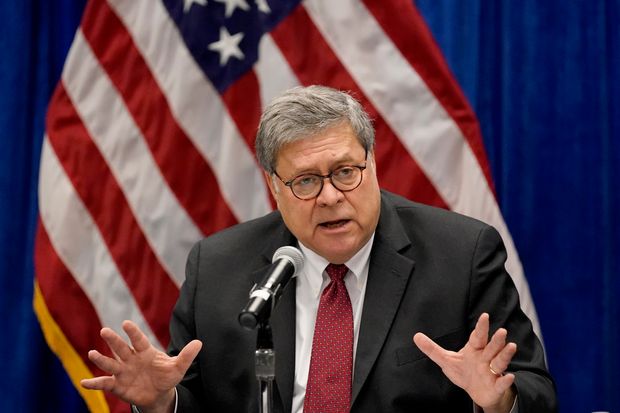Legislators in WASHINGTON agreed to a definitive breakdown of negotiations on the coronavirus aid package, with a bipartisan group ready to publish its proposal for the two most controversial parts on Monday afternoon.
A group of non-partisan legislators has set up a $908 billion aid package for Kovid-19. The United States said Monday that it would discuss its compromise on two key issues: the package of measures to protect the responsibilities of organizations working during the pandemic and the formula for allocating resources to government and local governments.
On Sunday, lawmakers said the two sides would be split into a single bill, while the less controversial provisions of their deal would be dealt with in a separate $748 billion bill, which includes the addition of $300 a week to fund four months of government unemployment benefits, $300 billion to support small businesses and $35 billion for healthcare workers.
In the meantime, the Speaker of the House
Nancy Pelosi
(D., California) had to reconvene with the Secretary of the Treasury.
Stephen Mnuchin
Negotiations between congressional leaders and the White House continued parallel to Monday on both the coronavirus control package and a year-long bill that legislators plan to pass on Tuesday. Mrs Pelosi and Mr Mnuchin spoke on Sunday.
After months of stagnation, legislators on both sides tried to adopt a different aid law, partly because the new pandemic had overburdened hospitals and created new restrictions for businesses. The first vaccinations were administered in the United States on Monday, after the virus had killed 300,000 people since the start of the pandemic.
We’re at the beginning of the end of this pandemic, when nearly 300,000 Americans died.
Senator Chris Koons
(D., Del.), who participated in an impartial proposal, said Sunday on NBC. We should not go on vacation until we have taken that $908 billion to give extra help to the millions of Americans threatened by displacement, hunger, unemployment and disease.
Legislators working on the Coronavirus bill face two challenges: Supporting national and local authorities and protecting accountability. Gerald F. Sabe of the WSJ explained why these issues are important and what a compromise might look like. Photo: Drew Angerer/Getty Images
Senator-majority leader
Mitch McConnell
(R., Cai.) reported last week that Republicans in the Senate would not approve proposals to defend the state and local accountability or funding for leaving the bipartisan group. He encouraged legislators to come closer to agreement on the other issues and to return to the other two next year.
It is unclear whether Mr McConnell could be more receptive to the proposal on cross party liability once the details of the group are known. It is expected that plaintiffs in coronavirus cases will have to prove that the defendant acted with gross negligence to expose people to the risk of infection with the virus, according to a person familiar with the proposal. Mr McConnell’s original proposal to protect liability would have set a standard for gross negligence, a step the Democrats were reluctant to take earlier in the negotiations.
Pandemic situation
Republicans believe that strong liability protection is necessary so that companies, schools and non-profit organizations can operate without risk of litigation and without accelerating economic growth. Democrats have argued that companies should not be allowed to relax security measures and that relatively few lawsuits have been filed in relation to coronaviruses.
According to the litigation file maintained by Hunton Andrews Kurth LLP, more than 6,500 such claims have been filed nationwide, but thousands of these cases have nothing to do with disclosure liability. Of these, 23 are linked to consumers reportedly infected with the virus, 158 leave medical facilities according to the database and 116 respond to working conditions. The majority of court cases are contract and rent disputes, disputes with prisoners and civil challenges related to state-imposed travel and business restrictions.
Some democratic leaders still insisted on putting funding for local and national governments on the weekend agenda, but their position may change this week as the 11 o’clock talks are likely to force further compromises.
According to Moody’s Analytics, the U.S. government budget deficit could reach approximately $434 billion between 2020 and 2022. Officials have been dismissed, others have reduced their salaries and the pension benefits of police officers, firefighters, teachers and other civil servants have come under increasing pressure.
In addition, some legislators have also called for a second round of direct incentive controls to be included in the coronavirus support package. Feel.
Bernie Sanders
(I., Vt.) and
Josh Hawley
(R., Mo.) Said they would have the Senate vote this week on a bill to add another $1,200 round of checks to the aid package because the checks were not included in the $908 billion bipartisan proposal.
The Leader of the Senate Council Caucus
John Tune
(R, S.D.) said last week that a second round of small controls was possible.
In the news, Fox, the White House spokesperson…
Kaylie McAnani
refused to say whether President Trump would be more actively involved in the negotiations and reiterated his support for direct inspections and company shields.
Write to Christine Peterson at [email protected] and Andrew Duren at [email protected].
Copyright ©2020 Dow Jones & Company, Inc. All rights reserved. 87990cbe856818d5eddac44c7b1cdeb8
Related Tags:



